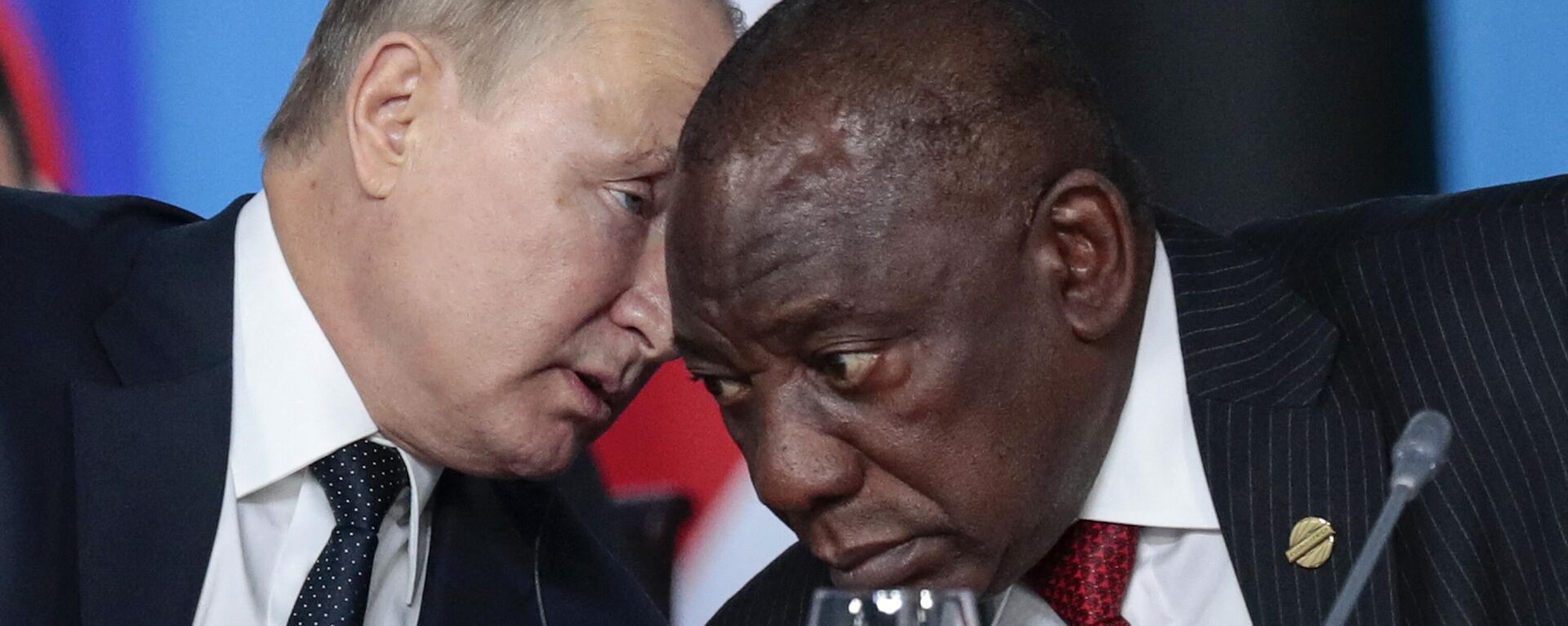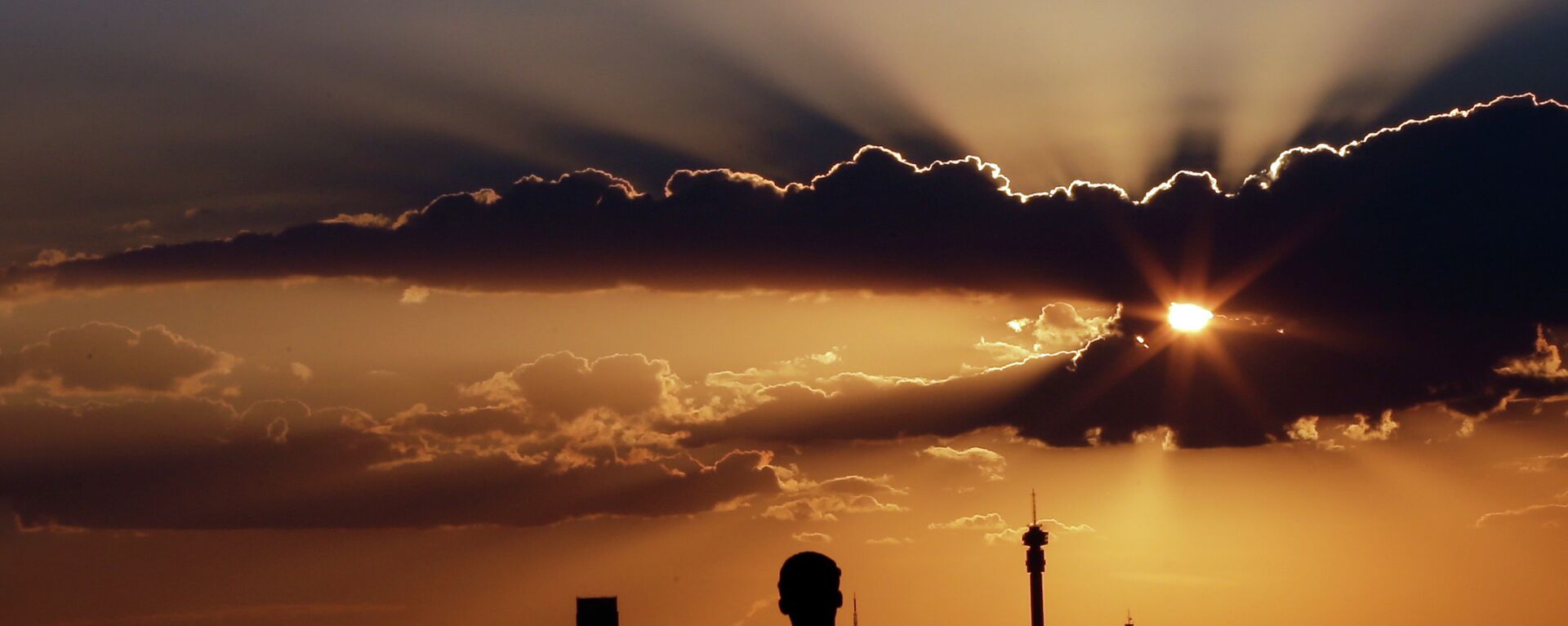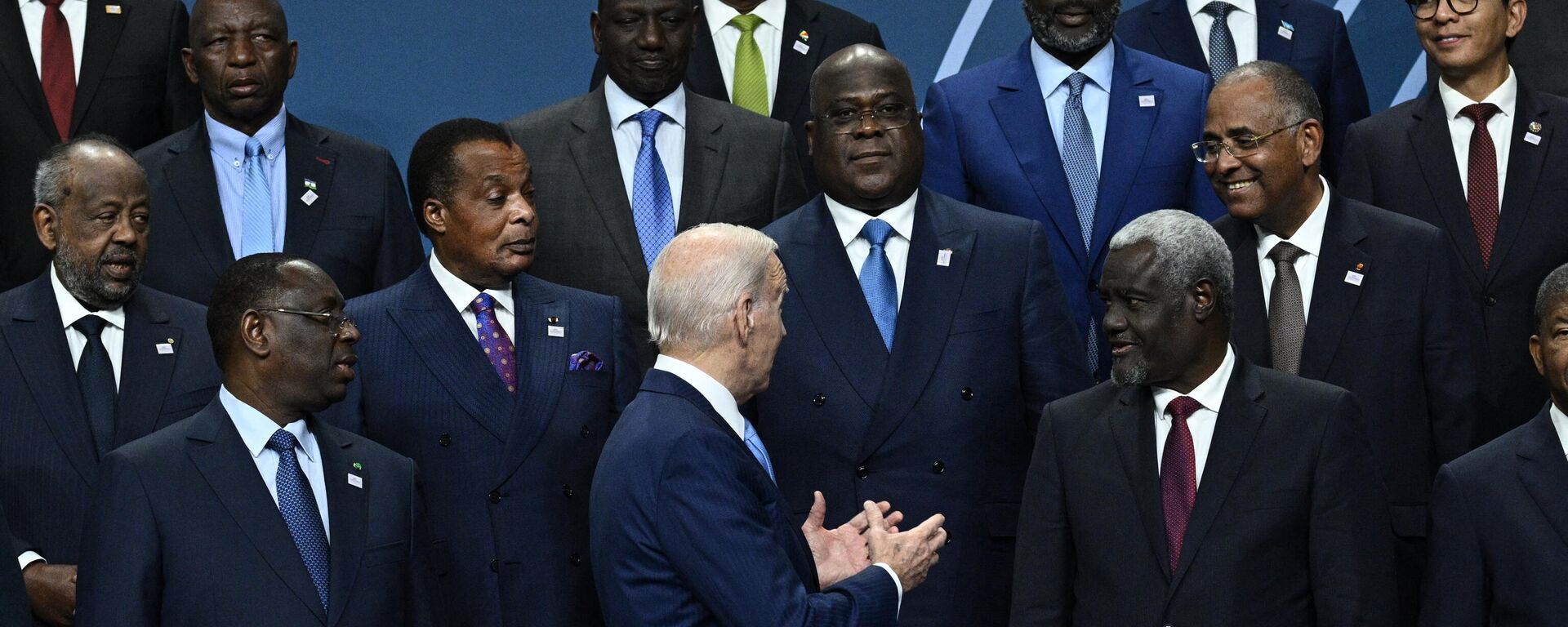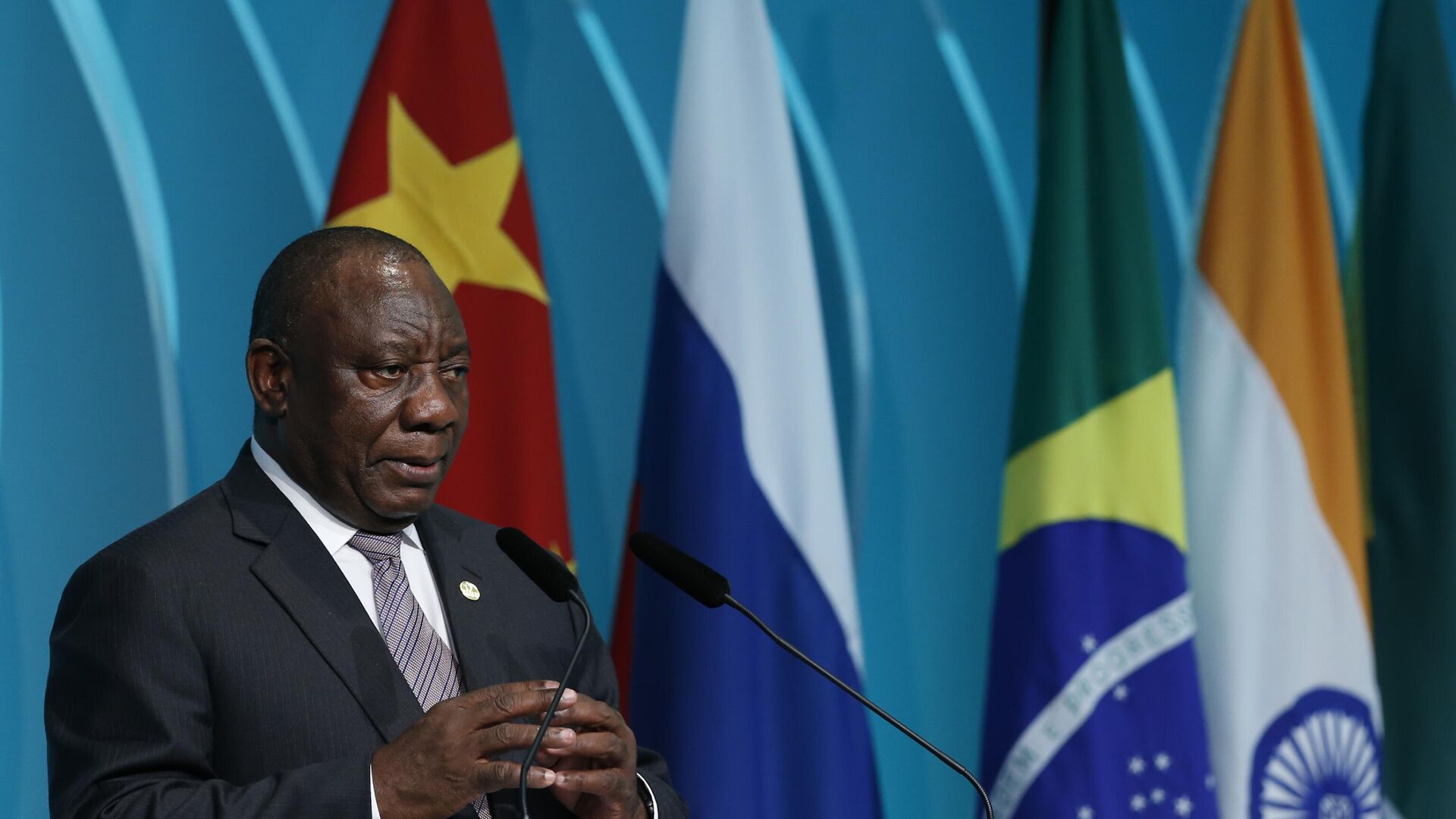https://sputnikglobe.com/20230112/from-unipolar-world-to-multipolarity-why-us-attempts-to-intimidate-africa-wont-work-1106251327.html
From Unipolar World to Multipolarity: Why US Attempts to Intimidate Africa Won't Work
From Unipolar World to Multipolarity: Why US Attempts to Intimidate Africa Won't Work
Sputnik International
South Africa has criticized Washington over its pressure campaign on African nations for maintaining relations with Russia. Defense and Military Veterans... 12.01.2023, Sputnik International
2023-01-12T13:53+0000
2023-01-12T13:53+0000
2023-01-14T06:50+0000
africa
opinion
africa in details
south africa
burkina faso
china
african union (au)
joe biden
russia
ukraine
https://cdn1.img.sputnikglobe.com/img/07e6/0c/0d/1105412458_0:0:3073:1728_1920x0_80_0_0_b429f79d60e5e228ee6e975bab210bdd.jpg
South African Defense and Military Veterans Minister Thandi Modise's criticism was sparked by reports concerning a delivery of “unidentified” cargo to the Simon’s Town naval base in December 2022 by an alleged Russia-flagged merchant ship.In November, when the US learned that the vessel in question was headed toward South Africa, the US Embassy alerted Pretoria that the ship had been subject to Washington's sanctions since May 2022. In accordance with US laws, Washington can impose restrictions on any entity, person or country that provides services to a sanctioned vessel.The US press said that the embassy received no response from the South African government, adding that the alleged sanctioned freighter was accepted at the nation's port in December.Addressing the issue earlier this week, Defense and Military Veterans Minister Thandi Modise told US media that "whatever contents this vessel was getting were ordered long before COVID," and lambasted Washington over the unjustified pressure the latter has imposed on African states maintaining ties with Moscow.Since the beginning of Russia's special military to demilitarize and de-Nazify Ukraine in February 2022, the US has been trying to isolate Moscow and disrupt its cooperation with the Global South.Earlier, on April 27, 2022, the US House of Representatives passed the HR 7311 Countering Malign Russian Activities in Africa Act with a bipartisan 419-9 majority. The legislation was aimed at sanctioning African nations over cooperating with Moscow. It was later referred to the Committee on Foreign Relations by the US Senate and appears to be on hold.Washington's Tools of CoercionWashington's hypocrisy is obvious, according to Ovigwe: on the one hand, the US asserted to African nations that it wouldn’t force developing countries to choose between Russia and China or the United States; on the other hand, US House lawmakers almost unanimously passed legislation aimed at punishing Africans for maintaining ties with Moscow."[I]t is not the place of the United States to dictate what supposedly sovereign countries should do," stressed the analyst. "This is the extraterritorialization of US law. So, if the US passes a law, that’s for the US; it has nothing to do with bilateral relations between two other countries."In addition to sanctions, the US could cut African nations off its global economic programs, according to Ovigwe. For instance, the Bill Clinton era's African Growth and Opportunity Act (AGOA) provides duty-free treatment for goods of designated sub-Saharan African countries (SSAs). Earlier this month, Burkina Faso, a desert landlocked African country located in the Sahel, was officially removed from the program by the US for not meeting the initiative's requirements. Last year, the Biden administration also terminated the AGOA program for Ethiopia, Mali, and Guinea over what it called "unconstitutional change in governments" and "the gross violations of internationally recognized human rights."Washington may also reduce or nullify foreign direct investment (FDI) to some African countries to twist their arm into halting relations with Moscow, Ovigwe continued.Still, the scholar does not think that removal from AGOA or lack of US investments could spell doom for the continent. The crux of the matter is that there are enough global players interested in Africa's growing market and rich natural reserves who are willing to fill Washington's shoes, according to him.Africa's Alternatives & OpportunitiesAfrica has far more promising development projects than the AGOA: in May 2019, the African Union (AU) kicked off the African Continental Free Trade Area (AfCFTA), which looks to create a single continental market with a population of about 1.3 billion. It could become by far the world’s largest free trade area, bringing together the 55 countries of the African Union (AU) and eight (8) Regional Economic Communities (RECs)."I don't think many countries will be losing sleep, fearing that they're going to be kicked out of AGOA, with the wealth of opportunities which may present themselves," Ovigwe noted.Remarkably, the US rushed to embrace the AU's project in December 2022, with the White House saying that the initiative "present[s] an extraordinary opportunity for the US to invest in Africa’s future."The US has long been lagging behind the EU and China in terms of trade with the continent. While the US trade with Africa reached $83.6 billion in 2021, it pales in comparison with the EU's €288 billion ($306 billion) and China's $254 billion in the same year.When it comes to FDIs, China, a US major geopolitical competitor, is currently investing heavily in Africa, noted Mikatekiso Kubayi, researcher at the Institute for Global Dialogue associated with UNISA and research fellow at the Institute for Pan African Thought and Conversation.Multipolarity is Answer to IntimidationWashington's unipolar approach creates an uneven playing field for developing countries as the US is still communicating with the Global South from a position of force, according to the observers. In contrast, the multipolar vision ensures equality and fair conditions for all players.The US attempts to coerce Africa into submission, including through anti-Russia legislation targeting the continent, "do not seem to generate confidence and positivity," Kubayi warned.Meanwhile, unlike the Group of Seven (G7) which appears to be a closed club of Western industrialized nations plus Japan, BRICS has the potential to grow and develop by adding new members, according to Ovigwe. Previously, Argentina, Iran, and Saudi Arabia signaled their interest in becoming BRICS members.The scholar added that he hopes the global system moves towards more new, open, and more dynamic platforms like BRICS.A multipolar world is taking shape, offering new alternatives and opportunities to developing states and thwarting attempts to intimidate global players by sanctions and use of force, according to the observers.
https://sputnikglobe.com/20230110/us-pressures-africa-over-russia-relations-south-african-defense-minister-says-1106189370.html
https://sputnikglobe.com/20221216/africas-free-trade-area-how-to-turn-dream-of-single-continental-market-into-reality-1105525631.html
https://sputnikglobe.com/20221222/too-little-too-late-us-not-flexible-enough-to-compete-with-china-in-africa-experts-say-1105669086.html
africa
south africa
burkina faso
china
russia
ukraine
Sputnik International
feedback@sputniknews.com
+74956456601
MIA „Rossiya Segodnya“
2023
News
en_EN
Sputnik International
feedback@sputniknews.com
+74956456601
MIA „Rossiya Segodnya“
Sputnik International
feedback@sputniknews.com
+74956456601
MIA „Rossiya Segodnya“
south africa, us warned south africa over cooperation with russia, anti-russia sanctions, sanctioned russian vessels, delivery of goods to south african ports, us attempts to intimidate african states, who is providing fdis to africa, global south, brics expansion
south africa, us warned south africa over cooperation with russia, anti-russia sanctions, sanctioned russian vessels, delivery of goods to south african ports, us attempts to intimidate african states, who is providing fdis to africa, global south, brics expansion
From Unipolar World to Multipolarity: Why US Attempts to Intimidate Africa Won't Work
13:53 GMT 12.01.2023 (Updated: 06:50 GMT 14.01.2023) Longread
South Africa has criticized Washington over its pressure campaign on African nations for maintaining relations with Russia. Defense and Military Veterans Minister Thandi Modise was quoted as saying that the US threatens African nations over "anything that is even smelling of Russia."
South African Defense and Military Veterans Minister Thandi Modise's criticism was sparked by reports concerning a delivery of “unidentified” cargo to the Simon’s Town naval base in December 2022 by an alleged Russia-flagged merchant ship.
In November, when the US learned that the vessel in question was headed toward South Africa, the US Embassy alerted Pretoria that the ship had been subject to Washington's sanctions since May 2022. In accordance with US laws, Washington can impose restrictions on any entity, person or country that provides services to a sanctioned vessel.
The US press said that the embassy received no response from the South African government, adding that the alleged sanctioned freighter was accepted at the nation's port in December.
Addressing the issue earlier this week, Defense and Military Veterans Minister Thandi Modise told US media that "whatever contents this vessel was getting were ordered long before COVID," and lambasted Washington over the unjustified pressure the latter has imposed on African states maintaining ties with Moscow.
Since the beginning of Russia's special military to demilitarize and de-Nazify Ukraine in February 2022, the US has been trying to isolate Moscow and disrupt its cooperation with the Global South.
Earlier, on April 27, 2022, the US House of Representatives passed the HR 7311 Countering Malign Russian Activities in Africa Act with a bipartisan 419-9 majority. The legislation was aimed at sanctioning African nations over cooperating with Moscow. It was later referred to the Committee on Foreign Relations by the US Senate and appears to be on hold.
Washington's Tools of Coercion
"One of the leverages is fear of sanctions," Eguegu Ovigwe, a policy analyst specializing in geopolitics and African affairs at Development Reimagined, told Sputnik. "I think HR 7311 - that is the act where the US secretary of state developed strategies which were submitted to Congress, an implementation plan, of course, to counter the so-called malign influence of Russian activities in African countries. So that really gives a legislative backing or legislative framework to potential sanctions that the African countries may come under if they continue to have a relationship with Russia that the US doesn't like."
Washington's hypocrisy is obvious, according to Ovigwe: on the one hand, the US asserted to African nations that it wouldn’t force developing countries to choose between Russia and China or the United States; on the other hand, US House lawmakers almost unanimously passed legislation aimed at punishing Africans for maintaining ties with Moscow.
"[I]t is not the place of the United States to dictate what supposedly sovereign countries should do," stressed the analyst. "This is the extraterritorialization of US law. So, if the US passes a law, that’s for the US; it has nothing to do with bilateral relations between two other countries."
In addition to sanctions, the US could cut African nations off its global economic programs, according to Ovigwe. For instance, the Bill Clinton era's African Growth and Opportunity Act (AGOA) provides duty-free treatment for goods of designated sub-Saharan African countries (SSAs). Earlier this month, Burkina Faso, a desert landlocked African country located in the Sahel, was officially removed from the program by the US for not meeting the initiative's requirements. Last year, the Biden administration also terminated the AGOA program for Ethiopia, Mali, and Guinea over what it called "unconstitutional change in governments" and "the gross violations of internationally recognized human rights."
Washington may also reduce or nullify foreign direct investment (FDI) to some African countries to twist their arm into halting relations with Moscow, Ovigwe continued.
Still, the scholar does not think that removal from AGOA or lack of US investments could spell doom for the continent. The crux of the matter is that there are enough global players interested in Africa's growing market and rich natural reserves who are willing to fill Washington's shoes, according to him.

10 January 2023, 11:40 GMT
Africa's Alternatives & Opportunities
Africa has far more promising development projects than the AGOA: in May 2019, the African Union (AU) kicked off
the African Continental Free Trade Area (AfCFTA), which looks to create a single continental market with a population of about 1.3 billion. It could become by far the world’s largest free trade area, bringing together the 55 countries of the African Union (AU) and eight (8) Regional Economic Communities (RECs).
"I don't think many countries will be losing sleep, fearing that they're going to be kicked out of AGOA, with the wealth of opportunities which may present themselves," Ovigwe noted.
Remarkably, the US rushed to embrace the AU's project in December 2022, with the White House saying that the initiative "present[s] an extraordinary opportunity for the US to invest in Africa’s future."

16 December 2022, 15:45 GMT
The US has long been lagging behind the EU and China in terms of trade with the continent. While the US trade with Africa reached $83.6 billion in 2021, it pales in comparison with the EU's €288 billion ($306 billion) and China's $254 billion in the same year.
When it comes to FDIs, China, a US major geopolitical competitor, is currently investing heavily in Africa, noted Mikatekiso Kubayi, researcher at the Institute for Global Dialogue associated with UNISA and research fellow at the Institute for Pan African Thought and Conversation.
"China continues to be the leading source of FDIs in Africa and has a pipeline of projects, particularly in infrastructure," Kubayi told Sputnik. "Africa's relations with China continue to deepen. This relationship can yield great benefits to both parties in joint research and development, manufacturing in Africa, and an African market that is expected to reach 2.5 billion in population by 2050. African wealth in minerals such as rare earths and others are all thoroughly purposefully explored for practical action and development."

22 December 2022, 06:00 GMT
Multipolarity is Answer to Intimidation
Washington's unipolar approach creates an uneven playing field for developing countries as the US is still communicating with the Global South from a position of force, according to the observers. In contrast, the multipolar vision ensures equality and fair conditions for all players.
"The recent G20 summit reiterated the importance of multilateralism and the United Nations in its declaration," Mikatekiso Kubayi underscored. "BRICS – which China and Russia are members of – emphasized the need to deepen and improve the practical experience of multilateralism with the United Nations at its center. The changing geopolitical landscape is changing precisely because of the realization that it does not benefit the majority of the world."
The US attempts to coerce Africa into submission, including through anti-Russia legislation targeting the continent, "do not seem to generate confidence and positivity," Kubayi warned.
Meanwhile, unlike the Group of Seven (G7) which appears to be a closed club of Western industrialized nations plus Japan,
BRICS has the potential to grow and develop by adding new members, according to Ovigwe. Previously, Argentina, Iran, and Saudi Arabia signaled their interest in becoming BRICS members.
"You have emerging multilateral platforms like BRICS, for instance, that have so much momentum, and seem to be more open to emerging powers, more focused on issues that are really important to the majority of the world," Ovigwe stressed. "One of the trends we might see going forward is countries tilting more towards these new and emerging multilateral platforms because they want it to be accessible to them. G7 is not going to be expanded – it has already contracted from G8 to G7."
The scholar added that he hopes the global system moves towards more new, open, and more dynamic platforms like BRICS.
A multipolar world is taking shape, offering new alternatives and opportunities to developing states and thwarting attempts to intimidate global players by sanctions and use of force, according to the observers.





